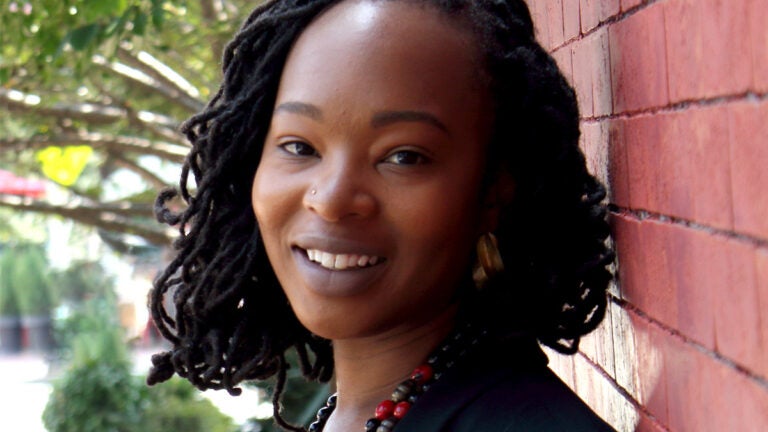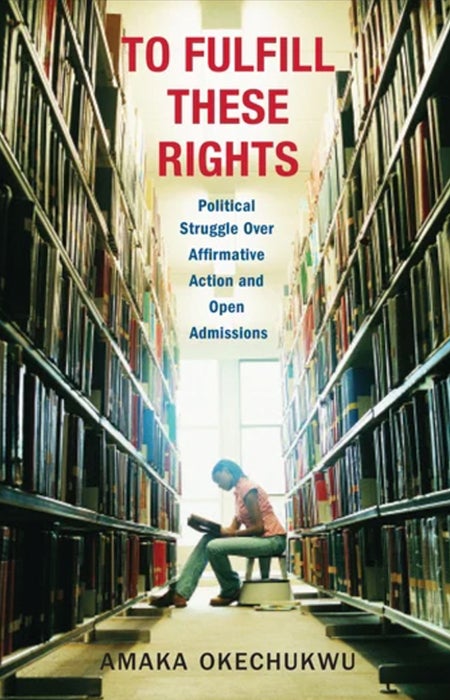
USC Dornsife alumna chronicles the history of — and threats to — affirmative action
As the child of two college-educated Black parents who is now an academic herself, Amaka Okechukwu ’08 sees affirmative action as a critical part of obtaining equal rights for people of color. But now, after decades of rollback and a steady dismantling of affirmative action policies at public universities, the economic and social gulf between racial groups threatens to widen even further.
“People forget that affirmative action in the post-civil rights period is a means of desegregation,” said Okechukwu, who majored in sociology and English, with a focus on creative writing, at the USC Dornsife College of Letters, Arts and Sciences.
Currently an assistant professor in the Department of Sociology and Anthropology at George Mason University in Virginia, Okechukwu recently published To Fulfill These Rights: Political Struggle Over Affirmative Action and Open Admissions (Columbia University Press, 2019). The book, which takes its title from a speech made by President Lyndon B. Johnson, chronicles anti-affirmative action ballot initiatives and federal court cases, how students have resisted attempts to roll back affirmative action policies, and how college administrators try to retain campus diversity even when they are legally not allowed to consider race as a factor in admissions. The book was recently awarded the Eduardo Bonilla-Silva Outstanding Book Award by the Society for the Study of Social Problems.
Affirmative action refers to policies and programs that provide special consideration to historically excluded groups in admissions decisions. “The historically excluded groups are typically Black, Latinx and Native American students,” said Okechukwu.
Affirmative action is implemented through a process of holistic review in university admissions, meaning it is considered in the context of the complete applicant file, she said. “Affirmative action does not equate to racial quotas, and in fact, quotas have been illegal since 1978.”
Affirmative action can also extend to outreach programs, targeted recruitment, scholarships and financial aid awards, retention and matriculation programs, and programs that encourage and support the attainment of advanced degrees. And with respect to university admissions, it almost exclusively operates at selective public and private institutions, Okechukwu explained.
“Affirmative action is under threat and it will likely end in the next few years. One of the reasons it hasn’t ended yet is that universities, public and private, are very invested in diversity as a campus commodity. Some universities have paid millions to keep their affirmative action programs. They are also invested in retaining university autonomy — they want to maintain control over who they will admit and how they will admit them. This extends to the admission of legacy students and athletes. But unlike the former, there is significant rollback and retrenchment of affirmative action policies,” Okechukwu explained.
Poetic justice
Higher education was a strong component in the success of Okechukwu’s own family. Her father immigrated to the U.S. from Nigeria for college and ended up staying. Her mother, a native of Oakland, California, was also college-educated.
Okechukwu grew up middle class in Oakland, where she got involved in social justice efforts and writing groups while still a teenager. It was with one such group, Youth Speaks, that she first started writing and performing spoken-word poetry.
“That space gave me a lot of room to be creative, and so when I came to USC, I was first a creative writing major, drawing a lot from my experience writing as an adolescent and teenager. I later on added sociology as a major because it provided a framework to help me understand the social world,” she explained.

Amaka Okechukwu’s book was recently lauded by the Society for the Study of Social Problems.
At USC Dornsife, Okechukwu continued to write poetry and short stories, and Jervey Tervalon, one of her creative writing teachers, invited her to read her work at The World Stage, a historic Black jazz and performance venue in the Leimert Park neighborhood of Los Angeles.
“He had me read during his set, which felt really important when I was in college,” Okechukwu said.
She was politically active at USC, as well. As president of the campus branch of the NAACP, she worked on voter outreach, political education efforts, national NAACP campaigns, and also led a peaceful civic disruption of a campus talk given by Ward Connerly, an opponent of affirmative action.
Politics, art and education for the “hip-hop generation”
Okechukwu’s research training started at USC with the McNair Scholars Program and continued under the Mellon Mays Undergraduate Fellowship under the guidance of Lanita Jacobs, associate professor of American studies and ethnicity and anthropology. She examined the political engagement of young people of color, following a framework of what is termed the “hip-hop generation,” the generation that came of age after hip-hop culture became popular. The research she conducted through the programs developed into her sociology honor’s thesis.
“That was such an important experience for me. I was able to explore something I loved — research — and didn’t quite know that I loved it,” she said. “I’ll say that doing independent research was the most foundational thing that I received from my undergraduate experience. I feel like I gained more methodological training through McNair and Mellon than in graduate school.” She earned her Ph.D. in sociology from New York University in 2015.
Okechukwu remarked that one of her favorite parts of the research process is interviewing people, and oral history became a significant part of her graduate and post-doctoral work. Her work and interviews at the Brooklyn Historical Society and Weeksville Heritage Center helped shape her next book, which concerns community organizing in Central Brooklyn during the 1970s and ’80s. An interview she conducted with Florence Miller, the widow of Crown Heights community leader Arthur Miller, who was choked to death by police officers in 1978, was especially powerful, Okechukwu said. Her interview recently informed a CNN story on Arthur Miller and his daughter’s experience growing up in the wake of his murder.
Okechukwu added that she has worked to train everyday people to become oral historians so they, too, can be “chroniclers of their communities,” particularly communities undergoing intense gentrification.
Diversity in the post-BLM era
Okechukwu believes that the Black Lives Matter movement and recent calls for racial justice mean that affirmative action will likely see renewed support on a popular level, at least for now. However, she added, there could be a legislative backlash coming.
“Conservative groundswell is how local anti–affirmative action propositions were adopted in the first place, and the rightward Supreme Court will likely further constrain, if not end, affirmative action,” she said. Paying attention to how student activists frame campus demands in relationship to racial justice and affirmative action will be key, she added.
If affirmative action does end, Okechukwu fears that the research and educational opportunities that she had will be unavailable to future generations of underrepresented students unless something is done to ensure they have equal access to higher education. Private universities, which at once have more money at their disposal and are not constrained by state legislators, will likely have to step up and play a larger role in safeguarding diversity, she said.
But for now, her advice to young scholars of color is to take advantage of the full range of research and extracurricular opportunities on and off campus wherever they’re enrolled. She noted that while many students today — especially those from economically vulnerable backgrounds — feel that they ought to pursue a professional path of study, she urges them not to shy away from the humanities and social sciences. Knowledge of history and critical thinking are necessary tools for creating and sustaining social change, especially now, when gains made since the civil rights era are under threat.
“What the humanities and social sciences can provide is a framework for understanding the social world, a means of interpreting the social world, a language for describing and making sense of current and past conditions,” she said. “Both humanities and social science thinking is necessary for imagining and building a better world.”